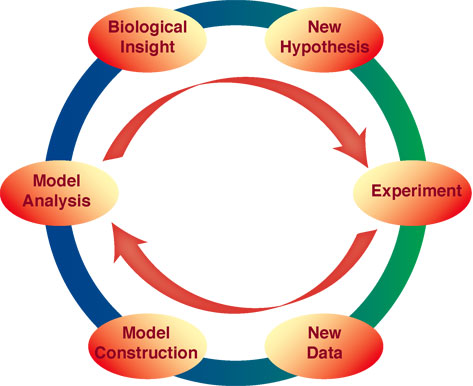
Centre for Integrative Systems Biology
at Imperial College (CISBIC)
[Meetings] [Sub-Projects] [Datasets]
NEW:
The CISBIC project has a new home page :
http://www.imperial.ac.uk/cisbic
Minutes and slides from the project meetings are still available
from: http://www.doc.ic.ac.uk/bioinformatics/CISBIC/meetings
Aims:
Biological systems are made up of very large numbers of different
components interacting at various scales. In the past, experimental
analysis of any single component, such as a gene or its protein
product, was extremely time consuming. Consequently a single laboratory
could study only a handful of such components at any one time. This led
to a conceptual framework in which a single trigger event (such as
receptor ligation or protein phosphorylation) was assumed to result in
a single effect, which in turn initiated a further effect and so on, in
a simple linear pathway.
In reality, most genes, proteins and other components carry out their
functions within a complex network of interactions. A single component
can affect a wide range of other components, and a complicated
combination of causes may need to be satisfied for a single effect.
Typical networks have positive and negative feedback loops that
regulate their operation. Consequently, a single component (such as a
gene) rarely controls any particular biological function, and
conversely any given component may influence many different functions.
The recent revolution in high-throughput technologies offers an
exciting opportunity to study such complex biological systems as an
integrated whole. The experimentalist is no longer restricted to a
handful of molecules. Sequence analysis provides a comprehensive
catalogue of all of the genes in an organism, and it is possible to
measure simultaneously thousands, or tens of thousands, of individual
genes, proteins and metabolites. At the same time, novel imaging
technologies allow the dynamic visualization of the spatio-temporal
distribution, evolution and interaction of key molecules in live cells.
The next challenge in life sciences research is to move on from
characterisation of individual components towards an understanding of
higher order systems represented by multimolecular modules, whole
cells, and intact organisms. This implies a shift from a study of
linear pathways to that of complex networks.
To meet this challenge, modern science requires new conceptual
frameworks. Complex data sets, and complex networks, can rarely be
understood using intuition, or traditional biological tools. Instead,
an interdisciplinary approach, involving techniques from the
mathematical, computational, physical and engineering sciences is
required. To be fully effective such an approach needs to repeatedly
traverse an iterative cycle of collaborative interaction (see figure
below).

For this to take place efficiently, a diverse range of experts from
different disciplines need to be unified in an environment that
encourages multidisciplinary research. We will do this by establishing
a Centre for Integrative Systems Biology at Imperial College (CISBIC)
which will draw on the many varied strengths of the institution and
extended collaborations, and on its long tradition of crossing
conventional subject boundaries.
We consider the main challenges for such a Centre to be:
- to demonstrate that the above cycle of hypothesis formulation,
experimental investigation, predictive modelling, model validation and
formulation of the next hypothesis delivers major biological insights
into complex systems;
- to develop a core of multidisciplinary expertise which can
champion this
- to introduce new technologies that enhance the quality and
quantity of relevant data;
- to stimulate research and teaching of systems biology in Imperial
College and in the wider research community.
Our strategy for developing such a Centre involves:
- providing facilities for the high-throughput methodologies
coupled to robust data integration;
- developing versatile strategies for mathematical, statistical and
computational modelling;
- tackling an exemplar biological problem of host-pathogen
interaction;
- stimulating and pump-priming others, both within and outside
Imperial College, to pursue a systems biology approach to a diverse
range of problems;
- developing teaching and training programmes in systems biology at
both undergraduate and postgraduate level;
- establishing national and international links with academic and
industrial colleagues.
Principal Investigator:
Co-investigators:
[Meetings] [Sub-Projects] [Datasets]


